 Hefty prices and consumer-baffling technology continues to hold back the development and adoption of space age converged digital home solutions, according to a survey by Accenture.
Hefty prices and consumer-baffling technology continues to hold back the development and adoption of space age converged digital home solutions, according to a survey by Accenture.
The survey – which involved 2,600 consumers in the US, UK, France, Germany and Japan – asked people their opinions on a converged digital home; i.e. a home system covering entertainment (home theatre, TV and hi-fis), healthcare (remote measure blood pressure sensing, pulse and temperature), home management (controlled security sensors, locks, fire detection and cameras) and the virtual office (voice, email and fax).
In no uncertain terms, cost was flagged up as the biggest barrier to purchasing a digital home solution, with more than three-quarters (80 percent) unhappy with the wallet-draining prices of home systems.
Consumers also wanted things simplified, with more than two-thirds (70 percent) saying that they would prefer to have a single provider for the content, services and digital devices.
“Despite strong consumer desire for a single aggregator for converged or complete digital home packages, many companies in this space provide only a portion of the content or services that comprise the complete digital home,” said Al Delattre, a partner in Accenture’s Communications & High Tech practice.
 “In order to truly meet consumer needs, stronger collaboration and partnerships among hardware, content and service companies is imperative,” he added.
“In order to truly meet consumer needs, stronger collaboration and partnerships among hardware, content and service companies is imperative,” he added.
The survey respondents were served up four different types of digital home formats – home entertainment, home heathcare, home management and virtual office offerings – and asked for their feedback.
When asked what benefit would most encourage them to wedge out for a converged digital home solution, the greatest number of respondents, 56 percent, said, “save money,” followed by, “make life easier” (46 percent), “improve home energy efficiency” (41 percent), “save time” (40 percent) and “make my life at home more fun” (34 percent).
Although consumers show strong interest in the digital home concept, it’s not just the cost that is making them a tad wary: the survey revealed concerns about data privacy and security (40 percent), complexity of installation (35 percent), equipment becoming outdated quickly (33 percent), and the need to replace current home equipment (32 percent).
The bad news for box-shifting hi tech companies is that a mere 4 percent of all respondents said they could afford a converged digital home service now, although 48 percent believed such a service would be affordable in one to five years.
Nearly one-quarter (24 percent) reckoned they’d never be able to afford such a service.
 But it’s not all doom and gloom, with consumers expressing a willingness to pay additional fees each month for services designed to enhance ease of use and convenience.
But it’s not all doom and gloom, with consumers expressing a willingness to pay additional fees each month for services designed to enhance ease of use and convenience.
In the survey, 65 percent of respondents said they’d be happy to shell out for digital home services and content in a subscription or leasing model, and that they’d be willing to pay an additional US$20 (~€16~£11) to US$50 (~€41~£28) per month for automated, value-added services like secured data backup, system support, and specialised content such as medical data collection.
“Consumers will increasingly become more of a development driver for digital home solutions,” said Delattre. “But it is clear that the technology itself is just one piece – business models and customer support are almost as important as the product itself. Without demonstrated and specific consumer preferences to drive adoption of the digital home concept, it will continue to be just that – a concept.”
Accenture
 TV advertisers and execs could be heard blubbing into their double tall skinny lattes all over Soho as a new survey revealed that around 90 percent of current users fast-forward through ads.
TV advertisers and execs could be heard blubbing into their double tall skinny lattes all over Soho as a new survey revealed that around 90 percent of current users fast-forward through ads. With more and more consumers buying digital video recorders (DVRs), this could spell disaster for the advertising industry.
With more and more consumers buying digital video recorders (DVRs), this could spell disaster for the advertising industry. Although the technology is still bubbling under the mainstream, BSkyB says about half of new subscribers opt for its Sky+ DVR, and with cable companies selling DVRs that are built into set-top boxes, advertisers are set for a bumpy ride ahead.
Although the technology is still bubbling under the mainstream, BSkyB says about half of new subscribers opt for its Sky+ DVR, and with cable companies selling DVRs that are built into set-top boxes, advertisers are set for a bumpy ride ahead. Cashpoint network The Link and IT bods Morse and have got together to launch a mobile banking service across the UK.
Cashpoint network The Link and IT bods Morse and have got together to launch a mobile banking service across the UK. Plans are afoot to extend the service to facilitate mobile payments direct from mobiles with customers being able to pay for items such as tube tickets and parking meters.
Plans are afoot to extend the service to facilitate mobile payments direct from mobiles with customers being able to pay for items such as tube tickets and parking meters. First Direct’s text messaging banking alert service has already proved a hit with their customers with 400,000 of its 1.2 million customers receiving balance statements by SMS.
First Direct’s text messaging banking alert service has already proved a hit with their customers with 400,000 of its 1.2 million customers receiving balance statements by SMS. ‘The Man’ in the form of the EC wants to introduce regulation to the Internet by bringing in controversial rules to cover television online, according to a report in the Times.
‘The Man’ in the form of the EC wants to introduce regulation to the Internet by bringing in controversial rules to cover television online, according to a report in the Times.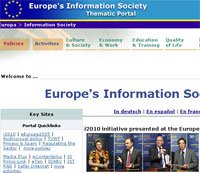 Internet-delivered TV is currently unregulated in the UK, so there is no compulsion for Web broadcasters to respect rules governing accuracy and impartiality or taste and decency that apply to all other analogue and digital channels.
Internet-delivered TV is currently unregulated in the UK, so there is no compulsion for Web broadcasters to respect rules governing accuracy and impartiality or taste and decency that apply to all other analogue and digital channels. Hefty prices and consumer-baffling technology continues to hold back the development and adoption of space age converged digital home solutions, according to a survey by Accenture.
Hefty prices and consumer-baffling technology continues to hold back the development and adoption of space age converged digital home solutions, according to a survey by Accenture. “In order to truly meet consumer needs, stronger collaboration and partnerships among hardware, content and service companies is imperative,” he added.
“In order to truly meet consumer needs, stronger collaboration and partnerships among hardware, content and service companies is imperative,” he added. But it’s not all doom and gloom, with consumers expressing a willingness to pay additional fees each month for services designed to enhance ease of use and convenience.
But it’s not all doom and gloom, with consumers expressing a willingness to pay additional fees each month for services designed to enhance ease of use and convenience.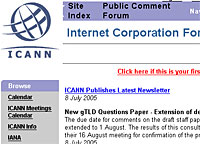 Consumers on the move will soon be able spot websites which have been specifically designed for mobile phones courtesy of the .mobi suffix.
Consumers on the move will soon be able spot websites which have been specifically designed for mobile phones courtesy of the .mobi suffix.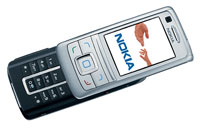 The companies hope that the new mobile-optimised websites will encourage consumers to upgrade their phones and access the web more while on the move – and thus generate lots of lovely lolly for their coffers.
The companies hope that the new mobile-optimised websites will encourage consumers to upgrade their phones and access the web more while on the move – and thus generate lots of lovely lolly for their coffers. European Commission heavies made an unscheduled visit to Intel offices in Europe today as the chip maker’s offices were raided in connection with suspected anti-trust violations.
European Commission heavies made an unscheduled visit to Intel offices in Europe today as the chip maker’s offices were raided in connection with suspected anti-trust violations. These requested information on government procurement tenders for computers containing requirements that they specify Intel chips or request a chip speed exclusive to Intel.
These requested information on government procurement tenders for computers containing requirements that they specify Intel chips or request a chip speed exclusive to Intel.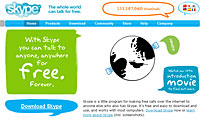 Boingo Wireless and Skype have fluttered eyelids at each other, gone for a quiet snog and, ruddy faced, jointly announced Skype Zones, a partnership that offers global Wi-Fi access to Skype customers at (ahem) “revolutionary” prices.
Boingo Wireless and Skype have fluttered eyelids at each other, gone for a quiet snog and, ruddy faced, jointly announced Skype Zones, a partnership that offers global Wi-Fi access to Skype customers at (ahem) “revolutionary” prices. Fluffing up the big pink cushions of corporate love, Niklas Zennstrom, Skype CEO purred passionately about his new partner: “Boingo is a world-class company that offers Skype users unprecedented global communications mobility and accessibility, at an aggressive, market disrupting price.”
Fluffing up the big pink cushions of corporate love, Niklas Zennstrom, Skype CEO purred passionately about his new partner: “Boingo is a world-class company that offers Skype users unprecedented global communications mobility and accessibility, at an aggressive, market disrupting price.” Monthly access to Skype Zones is $7.95 per month for unlimited Skype access or $2.95 (~€2.42~£1.66) for a 2-hour connection.
Monthly access to Skype Zones is $7.95 per month for unlimited Skype access or $2.95 (~€2.42~£1.66) for a 2-hour connection. The growth of photo and video-capable phones has resulted in news agencies sourcing more and more content from members of the public who have used their mobiles to record disaster scenes.
The growth of photo and video-capable phones has resulted in news agencies sourcing more and more content from members of the public who have used their mobiles to record disaster scenes. Jonathan Klein, CNN’s U.S. chief believes this “citizen journalism” will become a more important part of coverage in major news events. “No question about it,” he said. “There’s been a lot of talk in terms of the increased democratization of the news media relating to blogs and the like. This is another example of the citizen journalist.”
Jonathan Klein, CNN’s U.S. chief believes this “citizen journalism” will become a more important part of coverage in major news events. “No question about it,” he said. “There’s been a lot of talk in terms of the increased democratization of the news media relating to blogs and the like. This is another example of the citizen journalist.”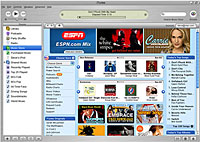 The Apple rumour mill has been cranking into overdrive over the weekend after Forbes reported that the company may be considering becoming a mobile phone operator.
The Apple rumour mill has been cranking into overdrive over the weekend after Forbes reported that the company may be considering becoming a mobile phone operator. However, a report in the Sunday Telegraph yesterday claimed that Motorola will finally “unveil the first fruits of its partnership with Apple next month with the launch of its iTunes mobile phone at the V Festival.” The festival runs from 20th to 21st August 2005.
However, a report in the Sunday Telegraph yesterday claimed that Motorola will finally “unveil the first fruits of its partnership with Apple next month with the launch of its iTunes mobile phone at the V Festival.” The festival runs from 20th to 21st August 2005. The UK record industry trade association the BPI has revealed that download sales in 2005 have raced past the ten-million mark – almost twice the amount for the whole of 2004.
The UK record industry trade association the BPI has revealed that download sales in 2005 have raced past the ten-million mark – almost twice the amount for the whole of 2004. Illegal music downloads remain a thorn in the side of the industry, but the growth in legal downloads now outstrips the growth in dodgy file sharing with Jamieson adding, “The battle against illegal files-haring will continue, but we are delighted to have hit this milestone so soon”.
Illegal music downloads remain a thorn in the side of the industry, but the growth in legal downloads now outstrips the growth in dodgy file sharing with Jamieson adding, “The battle against illegal files-haring will continue, but we are delighted to have hit this milestone so soon”.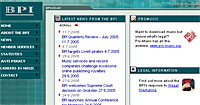 The resurgence of vinyl has been attributed to British indie and rock acts love affair with their near ancient format, with bands like Iron Maiden’s, Libertines, Babyshambles, Kaiser Chiefs and Franz Ferdinand all releasing songs on vinyl.
The resurgence of vinyl has been attributed to British indie and rock acts love affair with their near ancient format, with bands like Iron Maiden’s, Libertines, Babyshambles, Kaiser Chiefs and Franz Ferdinand all releasing songs on vinyl.